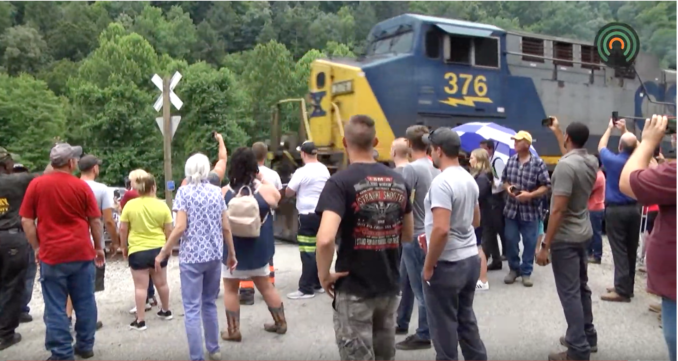Eastern Kentucky trans people support locked out Harlan County coal miners
Lill is a resident of Harlan County, Ky., and a member of a transgender anarchist support group (blackjewelminersblockade on Instagram) assisting coal miners locked out by the Blackjewel coal company. “Most of us are trans and the miners think that’s really cool,” she said.

Blackjewel miners and supporters watch a train engine leave without its load of coal. To prevent the entrance or exit of coal trains, they have occupied the railroad tracks ever since.
Blackjewelminersblockade has been providing support for the miners’ encampment set up on and adjacent to the CSX railroad tracks leading out of the mine. The encampment began July 29 after a few miners blocked a CSX train transporting over $1 million worth of coal. There are now hundreds of people either living at the encampment or visiting on a regular basis.
In late June, Blackjewel, one of several of the largest coal companies in the U.S. to go bankrupt, fired the Harlan County miners and about 1,300 others at 38 mines in Kentucky, West Virginia, Virginia and Wyoming. Not only did the miners lose their jobs, but after Blackjewel zeroed out its bank accounts, transferring all funds to a separate family-owned account, the miners’ last paychecks bounced to the tune of a collective $12 million! Plus, the company owes millions to the miners’ 401(k) retirement accounts.
Just prior to filing bankruptcy, the Wall Street Journal reported that Blackjewel’s primary stockholder, founder and former CEO Jeffrey Hoops Sr., transferred $34 million in cash out of the company to a bank account owned by members of his family. In the bankruptcy documents, Hoops lists himself as the primary creditor of his own company, claiming that the company owes him personally $22 million.
He claims an additional $5.9 million that is owed him by a Blackjewel-owned real estate company which is part of the bankruptcy filing and that Blackjewel owes $11 million to The Grand Patrician theme park and golf course, which Hoops is building on the site of a closed hospital. (news.littlesis.org, Aug. 15)
Hoops claims the funds are now unavailable to pay the wages and pensions owed the workers. The miners’ response is: “No pay, no coal!”
Building solidarity
Support from blackjewelminersblockade includes cooking, cleaning, child care, fundraising and other support. Lill says, “They [miners, families, friends] are just thrilled that people want to be there and help maintain things at camp, that people with training and experience in protest care want to help.” Their protest experience includes building a concerted grassroots movement that helped shut down the Trump government’s plans for a new federal prison in neighboring Letcher County.
Lill and others told the miners about Lesbians and Gays Support Miners, a group that supported British coal miners during the 1984-85 lockout by the Thatcher government, portrayed in the 2014 film “Pride.”
Lill went on to say, “We are building solidarity with folks who aren’t necessarily just like us — though we’ve found that we have more in common than we don’t.” Because the miners and their supporters face arrests and jail time, Lill says she and her group are also opposed to jails: “We have asked for a hard rule of letting us deal with problems at the camp, in-house, no cops. There is no one in denial that the prison and jail system is messed up and many of these folks have been touched by the opioid crisis and the criminalization of addiction. We have been [talking] and will continue to talk about racism and white supremacy, prison abolition and how we are wrecking the planet.
“We’ve also been surprised a few times. For example, one of the miners spent a lot of years of his life in support of Mumia Abu-Jamal. I can’t reiterate enough that people from eastern Kentucky are full of complexities and painting us with a broad brush of conservatism is just classism.”
All quotes from Lill: earthfirstjournal.org; general info: teenvogue.com and nytimes.com. See a video clip of Blackjewel miner supporters at tinyurl.com/y52tzz8l.
In 1974, Johnnie — then John — Lewis wrote the pamphlet, “Till Every Battle’s Won: The Brookside Strike of Harlan County,” with the comradely help of Vince Copeland, a founding member of Workers World Party and then editor of Workers World newspaper.
The Brookside strike was an important victory for all workers, not only because of the heroism of the miners who engaged in armed struggle with the coal operators, their gun thugs, and local and state police. But also after the miners (men) were all arrested for breaking a court injunction, women — including the miners’ spouses, daughters, mothers, grandmothers, friends and other relatives — took over the picketing, which included toe-to-toe battles with gun thugs and scabs.
Having struggled her entire life with sexual orientation and with gender, Johnnie is now living as a transwoman in Portland, Ore., where she is a WWP branch organizer.

